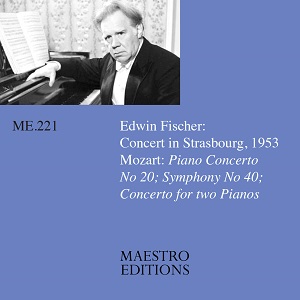
Edwin Fischer (piano, conductor)
Concert in Strasbourg, 1953
Wolfgang Amadeus Mozart (1756-1791)
Piano Concerto No 20 in D minor, K466 (1785)
Symphony No 40 in G minor, K550 (1788)
Concerto for Two Pianos in E-flat major, K365 (1779)
Recital in Paris
Alessandro Marcello (1673-1747)
Adagio (arr. JS Bach, BWV 974)
Wolfgang Amadeus Mozart (attrib.)
Romance, K Anh 205
Andantino K236 (arr. Fischer)
Introductions and applause included
Harry Datyner (piano)
Orchestre Municipal de Strasbourg
rec. 12 June 1953, Palais des Fêtes, Strasburg (Mozart Concertos and Symphony 40) and 30 April 1951, Paris (Interview, Marcello-Bach, Mozart)
Maestro Editions ME221 [2 CDs: 122]
These two CDs preserve the complete broadcast of an all-Mozart concert that Edwin Fischer gave in Strasbourg, accompanied in concertos by the city’s orchestra, which he also directs in the G minor Symphony. Announcements and applause, separately tracked, are included. So, too, is a radio interview and recital given in Paris on 30 April 1951.
Fischer recorded the D minor concerto twice, once on 78s and then on LP, on both occasions directing from the keyboard. As Roger Smithson reminds us, in his erudite notes, there is also a live recording conducted by Eugen Jochum. The Strasbourg concert is preserved in rather cloudy sound and there’s little real definition to it though, as Smithson says, it’s in better sound than any previous transfer, for which one must be grateful. Fortunately, too, the piano is quite forward in the acoustic of the Palais des Fêtes. Fischer encourages some involved playing from the orchestra – the first movement tuttis are positively passionate – and there is an extra electric charge in this live concert, where Fischer is freed from the rigidity of side changes, as in his 78 with the London Philharmonic, or the possibility of splices in the LP he was to make the following year with the Philharmonia.
I couldn’t say that his ethereal tonal qualities really survive the recording quality but enough remains audible, including some finger slips in the second movement where there’s also a half second tape glitch (probably via the original signal). His cadenzas are certainly anachronistic but full of a personal quality in their romantic musing on thematic material. The Concerto for two pianos in E flat major sees Fischer joined by the Swiss pianist Harry Datyner, an erstwhile pupil of his. This is a buoyant and exciting performance and again a little scrappy in places – co-ordination in the first movement isn’t perfect – and there’s some overload in the recording with brief thumping noises on the tape in the finale. This goes so well the audience spurs them on to repeat it as an encore, with increasingly vitalising results and renewed freedom from tension. Fischer, importantly, never recorded this concerto commercially.
Nor did he record Mozart’s G minor Symphony, which he does here with stirring depth of string tone and a graphic unfolding of the finale. Sonorities in the Minuet tend to be beefy but powerfully engaged, the whole symphony moving forward with logic and intensity. He plays the version of the symphony with clarinets.
The 1951 French broadcast has never before been released. It starts with a 5-minute interview then Fischer plays the Marcello-Bach Adagio – a rather clangy, hard recording unfortunately, in this of all pieces. This is something that also applies to the Romance attributed to Mozart and the Mozart-Fischer Andantino. The recorded sound is acceptable in the circumstances, but it’s not a desperately easy listen – unless you’re used to 78s, in which case it’s a doddle.
Live Fischer is rare and valuable. These examples are sonically compromised to varying degrees but worth preserving for the musical elevation they provide.
Jonathan Woolf
Availability: Maestro Editions

















